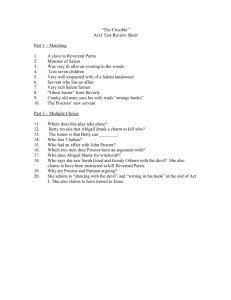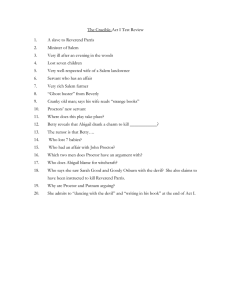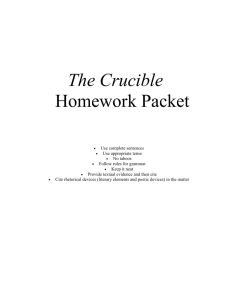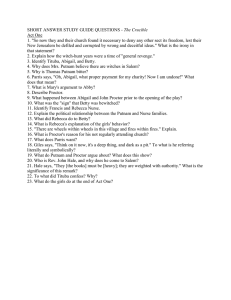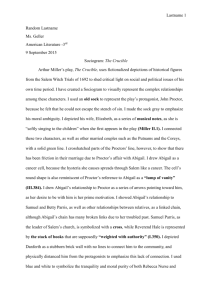The Salem Witch Trials vs. The Crucible
advertisement
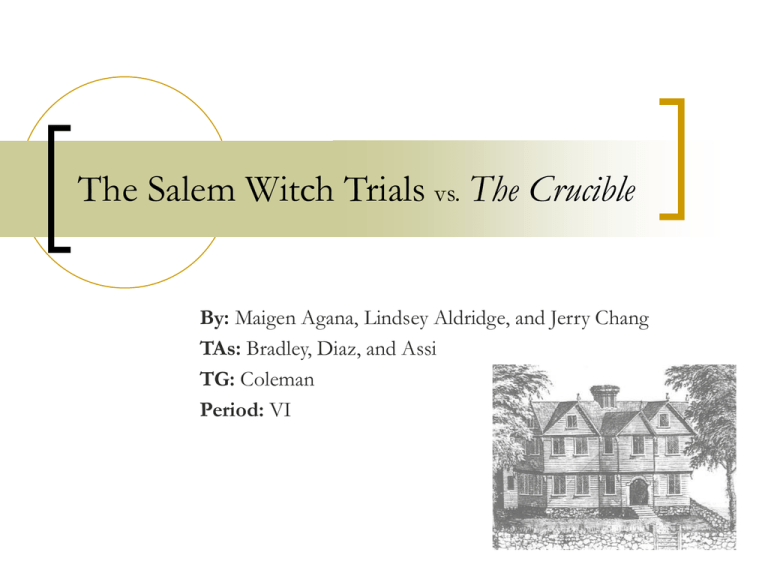
The Salem Witch Trials vs. The Crucible By: Maigen Agana, Lindsey Aldridge, and Jerry Chang TAs: Bradley, Diaz, and Assi TG: Coleman Period: VI So, What’s the Truth? THIS IS FICTION: 1. 2. 3. 4. Tituba led six girls into a nearby forest to cast charms and spells, followed by a wild dancing ritual. Ruth Putnam was the first girl to become afflicted. The only symptom of bewitchment was that the victim could not be woken from a deep slumber. John Proctor, Rebecca Nurse, and Martha Corey were all hung on the same day. AND THIS IS FACT: 1. 2. 3. 4. *** Tituba was asked to bake a “witchcake” in order to figure out who was afflicting Betty Parris. She was later accused of witchcraft by Betty and Abigail. Betty Parris and Abigail Williams were the first to become afflicted. Actual symptoms consisted of violent, physical tantrums. Rebecca Nurse was hung on July 19th, John Proctor on August 19th, and finally, Martha Corey on September 22nd. Tituba brought stories of voodoo and other supernatural events from Barbados. This alone compelled the girls to take part in harmless fortune-telling. The Parris Family THIS IS FICTION: 1. 2. 3. 4. Mrs. Parris had been dead for years and the family consisted of Betty (daughter), Mr. Parris, Abigail (niece), and Tituba (slave). Betty was present for the trials. Mr. Parris claimed to be a graduate of Harvard. Tituba was single and didn’t have family as a slave. Tituba confessed quickly. AND THIS IS FACT: 1. 2. 3. 4. Mrs. Paris was alive during the incident and died in 1969, four years after the incident. The Parris family consisted of Mr. and Mrs. Parris, Betty, Thomas, and Susannah; Abigail was only “kinfolk.” After the trials began Betty was sent away. Mr. Parris actually went to Harvard, but dropped out. Tituba was actually an Indian woman who had a husband named John and a daughter named Violet. She was also tortured for a long time before she confessed. The Proctor Family THIS IS FICTION: 1. 2. 3. 4. 5. John Proctor is young and is a farmer. Elizabeth is his only wife. John Proctor only has two young sons. Mary Warren was 17 in the story John and Abigail committed adultery. Abigail worked for the Proctors before Mary AND THIS IS FACT: 1. 2. 3. 4. 5. 6. John is actually 60 and a tavern keeper. Elizabeth is his third wife (his former wives died in childbirth) John has a daughter that is 15, a son that is 17, and another son that is 33 from a previous marriage. Mary Warren is 20. The adultery between Abigail and John is unlikely to occur as they lived far from each other and Abigail never worked for them. John testified to protect his then pregnant wife Elizabeth The Putnams, Nurses, & Giles Corey THIS IS FICTION: 1. 2. 3. 4. Daughter is named Ruth Putnam. Ruth was the only child of 8 to survive. Both of the Nurses were deeply respected and revered. Giles Corey was executed for refusing to reveal the name of a witness. AND THIS IS FACT: 1. 2. 3. 4. 5. The daughter’s real name is Ann, just like her mother’s. The Putnams had 6 living children. Rebecca Nurse was considered least likely to be a witch – she was seen as saint-like. The Nurses were not extremely respected because they owed money. Corey was accused of witchcraft and didn’t enter a plea. He was pressed with stones in an attempt to force him to plea either way, but he refused. The Trial This is Fiction The portions of Act II & Act III, that occur in the antechamber of the Courtroom are extrapolated from the Court records, but the actual text is lost to history. In the play the cause of the Salem witch trials is that of adultery. There is no historical evidence that Abigail Williams and John Proctor had an affair. This is Fact The portions of Act II & III that occur in the Courtroom are based on the actual court records. All of the known accusers struggled following the trials. Overall, many researchers have concluded that greed and jealousy caused the poorer members of the Salem community to create outlandish charges against the wealthier members of the community in order to confiscate their real estate and possessions. In some cases, relatives were accused of witchcraft in order for their progeny to claim their inheritance sooner, rather than later. Reparations were made to the families of the victims within five years of the Salem Witch Trials and a public apology was issued by the Commonwealth of Massachusetts. Take Away JW 1: Does the reality (facts vs. fiction) alter the lessons that can be learned from the Salem Witch Trials? JW 2: What are the “take aways” from this historical event? How can/ should this knowledge impact how we behave in the present? Bibliography “Historical Characters of The Crucible.” Historical Characters. 27 Oct. 2005 <http://people.stu.ca/~hunt/22230405/plays/crucible/characters.htm>. “Images of the Salem Witchcraft Trails.” Images of the Salem Witchcraft Trails. 27 Oct. 2005 <http://www.law.umkc.edu/faculty/projects/ftrials/salem/SAL_PHO.HTM> . “Salem Witch Trials - Biographical Information.” Salem Witch Trials. 27 Oct. 2005 <http://www.salemwitchtrials.com/biographies.html>. Burns, Margo. “Arthur Miller's The Crucible: Fact & Fiction.” 17th Century Colonial New England. 24 Oct. 2003. 29 Oct. 2005 <http://www.17thc.us/docs/factfiction.shtml>. Buhr, Chris, and Katherine Sutcliffe. “Biographies of Key Figures in the Salem Witchcraft Trials.” Biographies of Key Figures in the Salem Witchcraft Trials. 28 Oct. 2005 <http://www.law.umkc.edu/faculty/projects/ftrials/salem/ASAL_BI.HTM>.


